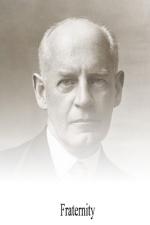“Oh, Mrs. Hughs,” she said, “we’ve been expecting you to hem the curtains!”
The woman slightly pressed the baby.
“I am very sorry, ma’am. I knew I was expected, but I’ve had such trouble.”
Cecilia winced. “Oh, really?”
“Yes, m’m; it’s my husband.”
“Oh, dear!” Cecilia murmured. “But why didn’t you come to us?”
“I didn’t feel up to it, ma’am; I didn’t really—”
A tear ran down her cheek, and was caught in a furrow near the mouth.
Mrs. Dallison said hurriedly: “Yes, yes; I’m very sorry.”
“This old gentleman, Mr. Creed, lives in the same house with us, and he is going to speak to my husband.”
The old man wagged his head on its lean stalk of neck.
“He ought to know better than be’ave ’imself so disrespectable,” he said.
Cecilia looked at him, and murmured: “I hope he won’t turn on you!”
The old man shuffled his feet.
“I likes to live at peace with everybody. I shall have the police to ’im if he misdemeans hisself with me!... Westminister, sir?” And, screening his mouth from Mrs. Dallison, he added in a loud whisper: “Execution of the Shoreditch murderer!”
Cecilia felt suddenly as though the world were listening to her conversation with these two rather seedy persons.
“I don’t really know what I can do for you, Mrs. Hughs. I’ll speak to Mr. Dallison, and to Mr. Hilary too.”
“Yes, ma’am; thank you, ma’am.”
With a smile which seemed to deprecate its own appearance, Cecilia grasped her skirts and crossed the road. “I hope I wasn’t unsympathetic,” she thought, looking back at the three figures on the edge of the pavement—the old man with his papers, and his discoloured nose thrust upwards under iron-rimmed spectacles; the seamstress in her black dress; the skimpy little boy. Neither speaking nor moving, they were looking out before them at the traffic; and something in Cecilia revolted at this sight. It was lifeless, hopeless, unaesthetic.
“What can one do,” she thought, “for women like Mrs. Hughs, who always look like that? And that poor old man! I suppose I oughtn’t to have bought that dress, but Stephen is tired of this.”
She turned out of the main street into a road preserved from commoner forms of traffic, and stopped at a long low house half hidden behind the trees of its front garden.
It was the residence of Hilary Dallison, her husband’s brother, and himself the husband of Bianca, her own sister.
The queer conceit came to Cecilia that it resembled Hilary. Its look was kindly and uncertain; its colour a palish tan; the eyebrows of its windows rather straight than arched, and those deep-set eyes, the windows, twinkled hospitably; it had, as it were, a sparse moustache and beard of creepers, and dark marks here and there, like the lines and shadows on the faces of those who think too much. Beside it,




